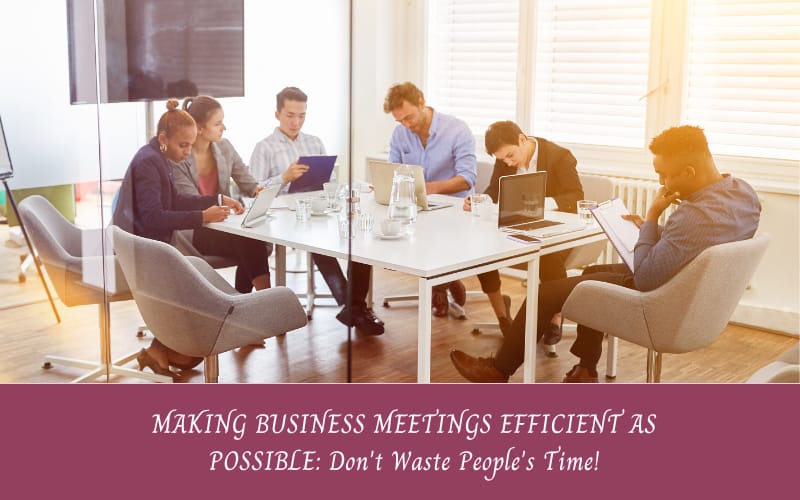Business meetings, how efficient can they be? What are the things to do or follow to make the most out of it, and not waste anybody or everybody’s time?
There’s a newly-released book I just read, called “The Brain-friendly Workplace” by Friedirike Fabricius, which had short passages about meetings.
HOURS SPENT IN MEETINGS
A number of executives spend an average of 23 hours per week in meetings which is more than half of the normal work time. But right, most executives work more than 40 hours so maybe not.
But, if those hours are used better, they could reduce their work time without affecting business performance. In short, have a work-life balance.
MAKING BUSINESS MEETINGS EFFICIENT
So, how do we make the most out of our business meetings?
7 Things:
1. Invite only the people who are really needed.
This is one of the major problems I see in business meetings, some people are there doing nothing but they’re invited because you want to be inclusive, but that’s really a waste of time for everybody.
If their opinions are not needed, if they won’t add value, if it’s not covered by their parts anymore – then don’t make them attend the meeting.
This can shorten the meeting time, sometimes even from an hour meeting to just 15 minutes or even less, because only the people necessary will be there. So, make sure those who’ll attend the meeting are really needed by assuring that the meeting benefits them, or meeting decisions to be made include them and affect them.
2. Do not add too many topics at once.
Prioritize. What are the topics that really need to be discussed? What are those that can be communicated outside of a formal business meeting?
Have a checklist according to prioritization and importance, eliminate those that are not really necessary to be discussed, and dedicate time for each of the topics.
Having a list and being clear on the only things needed to be addressed makes the business meeting as efficient and as effective as it could be.
3. Let them leave.
Yes, normalize employees needing to excuse themselves for a meeting. Let them leave. If they will not add value, if it seems very irrelevant to them, let them leave.
But of course, discuss this prior to the start of the meeting. That if they think the meeting will not benefit them in any way and vice versa, then they can excuse themselves and do something more productive.
4. Use an egg timer
What does that mean? Use an egg timer to let people talk for two minutes each. Why?
It’s a common problem where attendees raise their hands and then just end up rambling and rambling, and rambling and rambling. A waste of time for everybody, right? Because in the end, they say nothing important…
So set a time. Say, 2-3 minutes depending on the subject matter at hand and your tolerance. To each his own, right?
5. Provide copies before the meeting.
What copies? Copies of the list of the people who are going to be there, and a list of things that will be discussed in the meeting and nothing more, nothing less.
Preparing them like this lets them know what to expect and with that, helps them to gather their thoughts on the subject matter early so they can also raise their concerns at the meeting easier and efficiently.
6. Schedule meetings in the morning
Schedule meetings in the morning, so that the employees can leave work a little early when they are done for the day, and avoid making them do overtime, because if you schedule meetings in the afternoon, they’re going to have to wait for that even if they’re already done with their day’s work, and sometimes other meetings take longer than expected which then, in the end, requires them to stay longer until the meeting gets over.
belong to them, even
7. Don’t schedule meetings UNLESS needed.
What does this mean? Simple. If you’re setting up a meeting, but what you plan to discuss there can simply be discussed in quick email exchanges, then just don’t set a meeting at all.
VALUE EVERYBODY’S TIME
Remember, time is gold – so those 7 reminders above are important to keep in mind to make sure you’re not wasting your time, and your people’s time too.
Letting people do their work and use their time to do their work is more productive than making them sit long in a meeting that doesn’t benefit them and you at all.
GET HELP IF YOU NEED
If it feels hard to decide what you want to do on your own – get a mentor. Reach out if you need help. It is always important and there will always be things that you can support.
Check HERE to see if you feel like we’re a good fit.
Want to read more like this? CLICK HERE.
If you want to start your process for less stress in your life get my free e-book and start working.
To your success and keep smiling,


